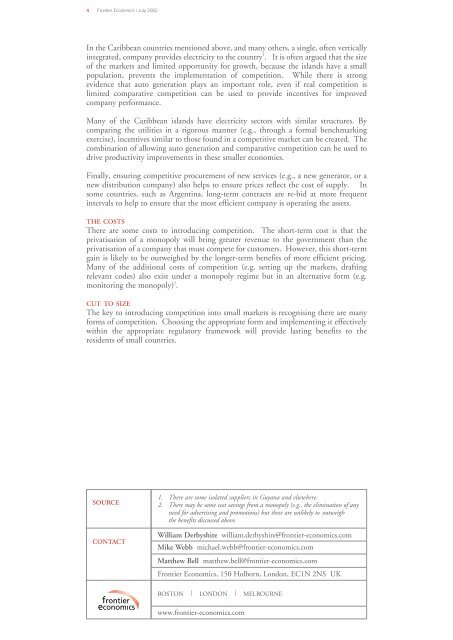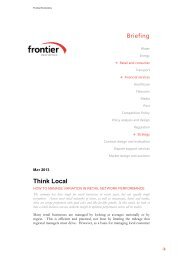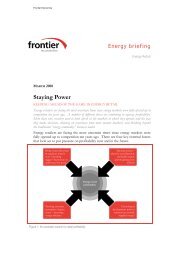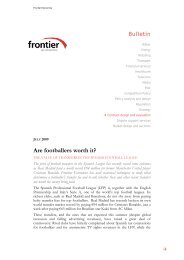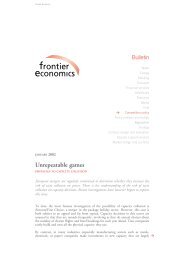too small for competition.pdf - Frontier Economics
too small for competition.pdf - Frontier Economics
too small for competition.pdf - Frontier Economics
Create successful ePaper yourself
Turn your PDF publications into a flip-book with our unique Google optimized e-Paper software.
4 <strong>Frontier</strong> <strong>Economics</strong> | July 2002<br />
In the Caribbean countries mentioned above, and many others, a single, often vertically<br />
integrated, company provides electricity to the country 1 . It is often argued that the size<br />
of the markets and limited opportunity <strong>for</strong> growth, because the islands have a <strong>small</strong><br />
population, prevents the implementation of <strong>competition</strong>. While there is strong<br />
evidence that auto generation plays an important role, even if real <strong>competition</strong> is<br />
limited comparative <strong>competition</strong> can be used to provide incentives <strong>for</strong> improved<br />
company per<strong>for</strong>mance.<br />
Many of the Caribbean islands have electricity sectors with similar structures. By<br />
comparing the utilities in a rigorous manner (e.g., through a <strong>for</strong>mal benchmarking<br />
exercise), incentives similar to those found in a competitive market can be created. The<br />
combination of allowing auto generation and comparative <strong>competition</strong> can be used to<br />
drive productivity improvements in these <strong>small</strong>er economies.<br />
Finally, ensuring competitive procurement of new services (e.g., a new generator, or a<br />
new distribution company) also helps to ensure prices reflect the cost of supply. In<br />
some countries, such as Argentina, long-term contracts are re-bid at more frequent<br />
intervals to help to ensure that the most efficient company is operating the assets.<br />
THE COSTS<br />
There are some costs to introducing <strong>competition</strong>. The short-term cost is that the<br />
privatisation of a monopoly will bring greater revenue to the government than the<br />
privatisation of a company that must compete <strong>for</strong> customers. However, this short-term<br />
gain is likely to be outweighed by the longer-term benefits of more efficient pricing.<br />
Many of the additional costs of <strong>competition</strong> (e.g. setting up the markets, drafting<br />
relevant codes) also exist under a monopoly regime but in an alternative <strong>for</strong>m (e.g.<br />
monitoring the monopoly) 2 .<br />
CUT TO SIZE<br />
The key to introducing <strong>competition</strong> into <strong>small</strong> markets is recognising there are many<br />
<strong>for</strong>ms of <strong>competition</strong>. Choosing the appropriate <strong>for</strong>m and implementing it effectively<br />
within the appropriate regulatory framework will provide lasting benefits to the<br />
residents of <strong>small</strong> countries.<br />
SOURCE<br />
CONTACT<br />
1. There are some isolated suppliers in Guyana and elsewhere.<br />
2. There may be some cost savings from a monopoly (e.g., the elimination of any<br />
need <strong>for</strong> advertising and promotions) but these are unlikely to outweigh<br />
the benefits discussed above.<br />
William Derbyshire william.derbyshire@frontier-economics.com<br />
Mike Webb michael.webb@frontier-economics.com<br />
Matthew Bell matthew.bell@frontier-economics.com<br />
<strong>Frontier</strong> <strong>Economics</strong>, 150 Holborn, London, EC1N 2NS UK<br />
BOSTON | LONDON | MELBOURNE<br />
www.frontier-economics.com


